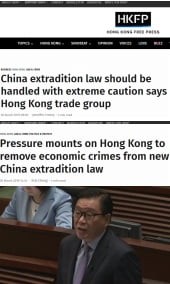Impressive Contortions of the Week Award goes to Hong Kong Chief Executive Carrie Lam as she twists and turns in trying to push through a revamped Mainland extradition system.
Her officials are still using an alleged murder by a Hongkonger in Taiwan as a pretext for this measure, complete with distasteful crocodile tears for the victim’s family, etc. If sending the suspect to face justice in Taipei was so important, they could in theory use existing case-by-case arrangements to extradite him – but that can’t/won’t happen because we must conform to Beijing’s fiction that Taiwan is not a separate country.
The irony is that Taiwan says it wouldn’t go along with the proposed new system anyway, precisely because it would formally treat the country as part of the PRC.
In fact, Taiwan is irrelevant to the whole thing.
As vividly evidenced by the Hong Kong administration’s uncharacteristic brisk urgency in all this, the proposal is an order from Beijing. The Chinese Communist Party wants easier extradition arrangements worldwide. The aim is not simply to catch and punish perpetrators of corruption and other offences, but to use criminal charges (real or trumped-up) to purge, silence or deter political enemies – which could mean anyone who crosses the wrong person or faction. To Beijing’s Leninist-minded leadership, it is absurd that it cannot use this intimidatory tool even in its own Hong Kong sovereign territory.
Since Xi Jinping took power, Chinese agents have (allegedly blah blah) abducted several people across the border through extra-legal means. These individuals probably had ultra-sensitive personal dirt on top leaders. Beijing would naturally like more formal ways to transfer other suspects, fugitives or anyone else, and apparently has a list of 300 already.
 The extradition proposal was bound to meet with opposition from lawyers and human-rights folk – now increasingly sidelined along with the rest of the city’s civil society. But it has also hit resistance from Hong Kong’s local and international business communities. These upstanding captains of industry, who normally grovel and kowtow instantly to government, suddenly have a bad case of the jitters.
The extradition proposal was bound to meet with opposition from lawyers and human-rights folk – now increasingly sidelined along with the rest of the city’s civil society. But it has also hit resistance from Hong Kong’s local and international business communities. These upstanding captains of industry, who normally grovel and kowtow instantly to government, suddenly have a bad case of the jitters.
Their reasons probably vary. Some may have a guilty conscience about actual Mainland business misdeeds like tax-dodging or bribery. Maybe some have messy personal lives – bigamy or whoring – over the border. All must know that the CCP has files on, and hooks in, everyone. It’s not a question of whether you have committed a crime, but whether the CCP wants to use one against you.
So the business community wants white-collar crimes exempted from the new extradition deal. The Hong Kong government – trying to leverage a gory murder in Taiwan, and eager to defend the city’s reputation as business-friendly (not to say a haven) – might be tempted to leave commercial crimes out of the deal. But to Beijing, white-collar crimes are probably the whole point.
If Beijing is in the mood to be pragmatic, it can leave the main white-collar offences out of the arrangements for a year or so, then come back and plug the gap. If the CCP is anxious to come after foes in Hong Kong, officials will just ram all or most of the plan through.
This is not a dummy run for Article 23 national security laws, but it is a taste of what’s coming as the CCP extends its capricious rule-of-law system of control into Hong Kong.

One of the old boasts of Invest Hong Kong was that the city was home to more Asia Pacific headquarters of multi national corporations than other regional cities. You don’t hear this anymore and in fairness astronomical property prices have played their insidious part. The remaining corporations, that do have their Asia Pac headquarters here, will be looking very closely at Carrie Lam’s latest brain fart (admittedly the wind originated further north). Even Amcham and the US Consul General has been recently unusually blunt.
So Carrie Lam’s message to the cities brightest and best is feck off to Singapore, Sydney, Tokyo because there is nothing for you here.
As one has previously mentioned, the concept of extradition has been to return tried convicted fugitives to the relevant original criminal jurisdiction and not to return those who have been neither criminally tried nor convicted.
A list of wanted persons whose alleged crimes, however seemingly egregious, is a just a list. It is hardly a basis for legal proceedings to hand over persons in HK to the PRC.
@old git
Actually, extradition generally returns a person to the jurisdiction in which a crime allegedly was committed in order to face prosecution there. It’s primarily for fugitives from justice, not escapees from custody or those convicted in absentia.
This is both factual and beside the point. Politically-motivated charges are the key exception to the typical extradition agreement, but, of course, every exercise of state power in the mainland is politically motivated.
The sole purpose of any extradition agreement with the mainland is to give a veneer of legal legitimacy to what the Americans call rendition and to remove the need for those messy, inconvenient kidnappings.
The CCP are just looking for a means to drag Miles Kwok (Guo Wenjui) back from New York to stop his daily rants – and maybe a little more? They failed with the Interpol ‘Red Notice’ and their supposed man had to pay for this.
Taiwan and China have had an extradition arrangement since 1990. Just saying.
@Walter : It’s Hong Kong’s fate to be perpetually stuck in the 80s, like a sad version of Groundhog day